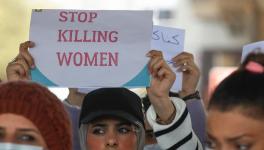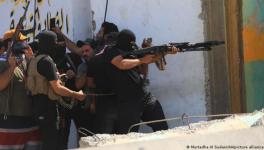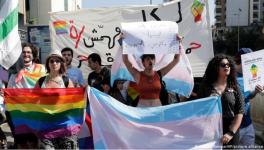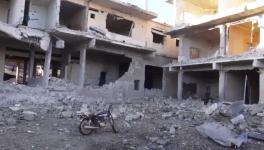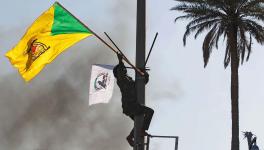MEA’s Abject Failure: Why Did It Take Swaraj 4 Years to Say What She Has Confirmed Now?
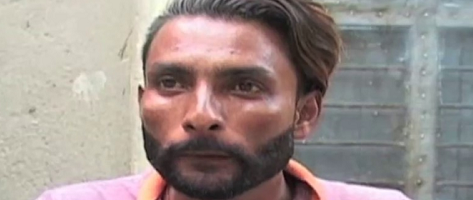
Minister of External Affairs Sushma Swaraj confirmed the massacre of 39 Indian citizens who had been kidnapped by the Islamic State in Mosul, Iraq, four years ago. This confirmation comes after conflicting statements by the Minister starting with news of the abduction, followed by assurances that they were alive in 2015, moving into ‘cannot confirm without proof’ in 017 and now the confirmation of their deaths.
Chief Minister of Punjab Amarinder Singh claimed that the government had known of the deaths before. Former minister Shashi Tharoor wanted to know why the government had given “false hopes.” There was dismay all around, with the Opposition openly attacking the government for giving hope to the families when there was none.
Swaraj stated in Parliament that the bodies of the Indian workers were exhumed and DNA samples sent for forensic tests. She said that Minister of State for External Affairs General VK Singh will go to Iraq to bring back the mortal remains. He had been sent earlier as well to speak to the Iraqi authorities and had returned with no clues about the well being, or otherwise, of 39 Indian nationals who seemed to have disappeared into thin air insofar as the Indian government was concerned.
Swaraj had first assured the families and Parliament that the Indians were alive. And when confronted by the Opposition in Parliament had said that she had received information from at least “eight” (figure remained variable) sources that the prisoners were well. She continued to deny the possibility of their death, even as AAP MP Bhagwant Mann had brought Harjit Masih forward at a press conference to confirm a dramatic development. In that Masih, 25, claimed to be one of the men abducted, but had managed to escape. He said that he had seen all the others being massacred and no one was alive.
Swaraj had denied this leading Mann to say, “External affairs minister Sushma Swaraj says the boys are safe and the government is trying to get them back... Can she at least make these boys talk to their families over the phone so that it assures them?”
According to Harjit Masih, “They were at least fifty kidnappers. Their faces were covered and were armed. They asked us to give them our passports. We were taken to a place at an hour’s drive from Mosul and kept in a basement. The next day we were shifted to an abandoned thread factory where we contacted our families and told them not to worry as the kidnappers told us we would be released soon. After 3-4 days the Bangladeshis were segregated from us and we were taken to a semi-hilly area. I saw several dead bodies there. We were asked to hand over our mobile phones and money and sit down. Then the kidnappers started firing at us. A bullet grazed my leg but I was alive. I got up after they left and stopped a taxi and asked to be taken to the airport. Another taxi took me to a check post captured by the IS. I told the IS that I was a Bangladeshi and had lost my passport. They allowed me to go further. I was sent back to my company... I borrowed someone’s phone and called the Indian embassy number.”
Masih claimed that he was then picked up by the Indian embassy and brought back. “I stayed in Gurgaon for some months after which I was sent to Bengaluru for electrical repair training. I was told I would be given a job. I stayed in Greater Noida for a few months. My family knew I was safe but it was to be kept under wraps because I was told the IS threat was still there,” he said.
Sushma Swaraj, however, had disputed Masih’s version of events. "We are not sparing any efforts to find them. We are hopeful that we will be able to find them and bring them back home. I have eight different sources who say that they are alive," Swaraj told the media after families of the hostages met her in New Delhi three years ago again. ““There is no reason to believe him. If we believe him, it will mean that we end our search. I don’t want to give up hope on this and we are looking for proof,” Sushma Swaraj had said.
This is not the first time reports had emerged regarding the fate of the Indian hostages. In November 2014 two Bangladeshi workers -- Shafi and Hasan -- who were working for a construction company spoke to ABP News from Kurdistan’s capital Erbil. Shafi and Hasan relayed news of one kidnapped Indian -- Harjeet Masih -- who had managed to escape the Islamic State and had told them of the fate of the 39 Indians who remained in the militants’ hold; all 39 had been executed by the IS, Masih reportedly told Shafi and Hasan.
The report, soon picked up by the Indian media, prompted the Congress party to claim the government has known about the fate of the Indian nationals. Countering this claim, Swaraj at the time said, “We have information from six (the number she gave varied from 6 to 9) different sources that the 39 Indians kidnapped in Iraq in June have not been killed… It is my responsibility to continue with the search on the basis of statements of these 6 sources.”
The kidnapped Indian nationals were working with a Turkish construction company in Mosul when the militants took over.
Although India stepped up efforts to bring back Indians based in Iraq following the advance of the IS, the MEA has been fairly silent on the status of the 40 hostages. It is not even known whether the Indian government has any idea about their location, or whether contact with the militants has been established for their release. Except for occasional bouts of concern when dignitaries from Iraq or even Palestine visited, there appeared to be little to no concerted follow up.
Soon after the kidnapping, ANI news agency quoted a number of family members expressing their frustration and demanding answers on the progress being made to secure the release of the construction workers. "We are going to meet the External Affairs Minister. We have not got any information (about our relatives) as yet. We will plead with her to bring back my brother who is stranded in Iraq. This is the second time we are going to meet the External Affairs Minister,” a relative was quoted as saying, adding, "If we do not get a satisfactory response, then, we will sit on protest at Jantar Mantar." They did not get a response or assurance except a “we will not say anyone is dead without proof” from the government. This has now changed to “they are all dead” after four years of sheer anguish for the relatives of the poor workers.
India had celebrated the safe return of 46 Indian nurses, who had been stranded in Tikrit as the IS militants took control of the city, as a diplomatic success. Even then, the nurses were quoted by the media portraying a grim situation, with the Hindustan Times quoting one of the captive nurses, Sona Joseph saying, “Our government wasted a lot of time. Now, they can send coffins to take us back.”
“We were politely resisting their moves to shift us from the hospital but now their tone is different. We have no option but to obey them,” the nurse added in reference to a complication in the hostage situation that involved shifting from Tikrit to Mosul.
On arriving in India, one of the nurses told Reuters, "I thought I will never come back. I thought, (in the) last two days I am finished. These are my last days.”
The Indian government did not share details concerning the release and return of the nurses, with the Foreign Ministry saying that diplomatic channels and “unconventional methods” were behind the release. "There was an enormous amount of effort that was put in both within Iraq and outside Iraq," former MEA spokesperson Akbaruddin had said.
The same level of secrecy surrounds the Indian government’s dealing with the hostage crisis involving the construction workers in Mosul. If the safe return of the nurses was a diplomatic success, the lack of information regarding the construction workers can only be termed a major diplomatic failure.
Significantly, after Iraqi Prime Minister Haider Al-Abadi declared victory over the ISIS in Mosul last year VK Singh had left to gather information. As per media reports he met senior Iraqi leaders are returned to inform Swaraj that the abducted 39 Indians were deployed at a hospital construction site. And then were shifted to a farm. After that they were moved to a jail in Badush where the fight between the Iraqi forces and IS, according to the Minister herself, was still carrying on at the time. This was last year, 2017. Later news that the Badush jail where the Indians were reportedly lodged according to Swaraj was gutted broke. However, there was no word from the government about the fate of the workers or acknowledgement that they could have been killed as well. That is if they were indeed lodged there!
Despite the ‘liberation’ of Mosul by the Iraqi forces later, there was still no word about the fairly large group of Indian hostages. The government did not bother to explain, or find out, the prognosis. Or if it did, it remained within the confines of South Block.
MEA did not come out with a single concrete statement about the fate of the prisoners, linking this with the developments in Iraq and the region. Swaraj led the effort swining from “they are alive” till 2016; to “we need proof to say anything else”in 2017; to the pronouncement today in Parliament.
That Mosul had been the seat of fierce fighting between the IS and the Iraqi forces; that the Indian prisoners had not been heard from after the abduction; that stories of them being lodged in a church, a factory, a farm and a jail appeared preposterous and needed proper confirmation that did not seem to have been forthcoming; that a hostage had escaped with a story of their massacre early on in the crisis but was whisked away from public view (Masih’s family had claimed he was under detention, Swaraj denied it, after which he returned home with no word as to what part of his story was correct or wrong for that matter) are all indicators that the government and diplomacy failed, and failed disgracefully in not just tracking the hostages but in dealing with their relatives who have had a rough time trying to even get the attention of those in power.
Obfuscation, to use a mild word,at its best.
Disclaimer: The views expressed here are the author's personal views, and do not necessarily represent the views of Newsclick.
Get the latest reports & analysis with people's perspective on Protests, movements & deep analytical videos, discussions of the current affairs in your Telegram app. Subscribe to NewsClick's Telegram channel & get Real-Time updates on stories, as they get published on our website.









